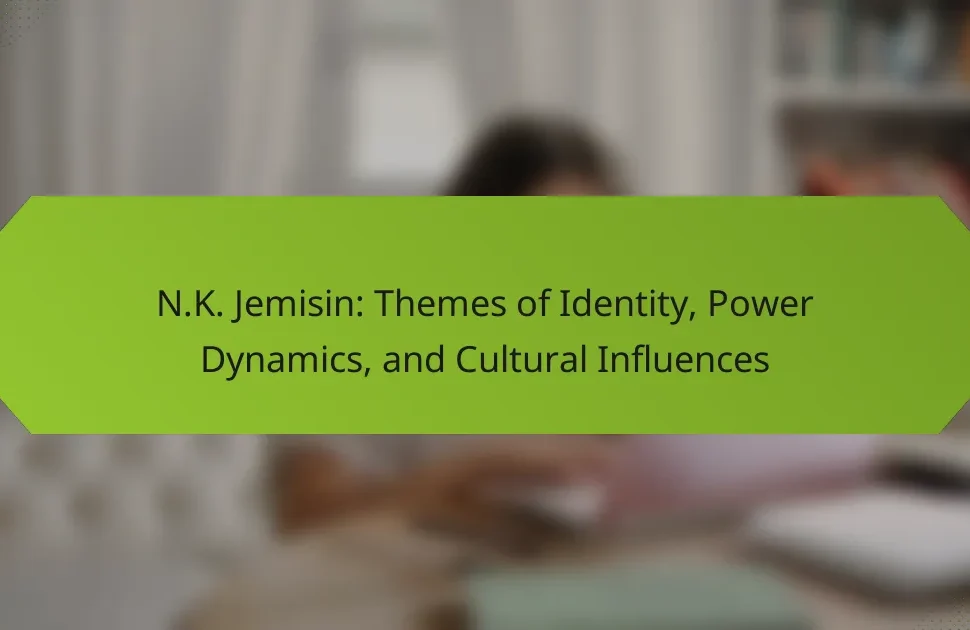Octavia Butler’s work challenges societal norms by addressing social issues like race, gender, and power dynamics. Her narratives feature marginalized characters navigating oppressive systems. Through profound character development, Butler illustrates resilience and agency. This article explores her unique narrative styles, the integration of social commentary, and the emotional depth of her characters.

How does Octavia Butler’s work challenge societal norms?
Octavia Butler’s work profoundly challenges societal norms by exploring themes of race, gender, and power dynamics. Her narratives often feature marginalized characters who navigate oppressive systems, prompting readers to confront uncomfortable truths about society. For instance, in “Kindred,” Butler examines the complexities of slavery and its lasting impacts, blending historical fiction with speculative elements. This unique approach encourages critical reflection on contemporary social issues, making her work relevant and thought-provoking. Through rich character development, Butler empowers her protagonists, illustrating resilience and agency in the face of adversity.
What social issues are prevalent in Butler’s narratives?
Octavia Butler’s narratives often explore social issues such as race, gender inequality, and class struggle. Her works highlight the complexities of identity and power dynamics. For instance, “Kindred” addresses the historical impact of slavery, while “Parable of the Sower” examines social breakdown and survival in a dystopian future. Butler’s characters frequently navigate these issues, reflecting real-world challenges and prompting readers to consider their implications.
How do her characters reflect real-world struggles?
Octavia Butler’s characters embody real-world struggles through their complex backgrounds and societal challenges. Her protagonists often face oppression, identity crises, and moral dilemmas, reflecting the experiences of marginalized groups. For instance, in “Kindred,” Butler explores themes of racism and gender inequality by placing her character in historical contexts that resonate with contemporary issues. This unique approach allows readers to engage with difficult subjects, fostering empathy and understanding. Through speculative fiction, Butler highlights resilience and the human spirit in the face of adversity, making her characters relatable to real-world struggles.

What are the key themes in Butler’s speculative fiction?
Octavia Butler’s speculative fiction explores themes of social inequality, identity, and human resilience. Her narratives often reflect on race, gender, and power dynamics, challenging societal norms. Character development in her works is profound, showcasing complex individuals who navigate oppressive systems. Butler’s unique ability to blend speculative elements with real-world issues fosters deep emotional connections and critical reflections on humanity.
How does Butler incorporate elements of Afrofuturism?
Butler incorporates elements of Afrofuturism by blending African culture with futuristic themes. Her narratives often explore social issues like race and identity through speculative settings. For instance, in “Kindred,” time travel serves as a device to confront historical injustices. Unique attributes of her work include complex characters who navigate oppressive systems while envisioning alternative futures. This approach not only highlights the resilience of the African diaspora but also critiques contemporary societal structures.
Which ethical dilemmas are explored in her stories?
Octavia Butler explores ethical dilemmas such as power dynamics, identity, and social inequality in her stories. Her characters often face moral conflicts that challenge societal norms and personal beliefs. For instance, in “Kindred,” the protagonist grapples with the implications of slavery and her own ancestry. Butler’s narratives encourage readers to reflect on complex issues like consent and survival in oppressive systems. These dilemmas resonate with contemporary social issues, making her work profoundly relevant.

In what ways does Octavia Butler develop her characters?
Octavia Butler develops her characters through deep psychological exploration, social context, and complex relationships. She often uses unique attributes to create multidimensional characters that reflect broader societal issues. For example, her protagonists frequently face moral dilemmas, showcasing their growth and resilience. This approach allows readers to connect with characters on a personal level, making their struggles and triumphs resonate. Butler’s focus on diverse backgrounds further enriches character development, adding layers of authenticity and relatability.
What techniques does she use for character depth and complexity?
Octavia Butler employs various techniques to create character depth and complexity. She uses rich backstories to provide context, allowing readers to understand characters’ motivations. Butler often incorporates diverse perspectives, reflecting social issues that enhance character relatability. Unique traits and flaws make her characters multidimensional, fostering emotional connections. Additionally, she utilizes internal conflict, illustrating characters’ struggles with identity and societal expectations.
How do her characters evolve throughout her works?
Octavia Butler’s characters evolve significantly, often reflecting complex social issues. They undergo profound transformations that highlight resilience and adaptability in challenging environments. For example, in “Kindred,” Dana’s journey through time forces her to confront her ancestry and the legacy of slavery, which reshapes her identity. Similarly, characters in “Parable of the Sower” develop survival skills in response to societal collapse, illustrating their growth amidst adversity. Butler’s unique ability to intertwine character development with social commentary enhances the depth of her narratives.

Which unique narrative styles are employed by Butler?
Octavia Butler employs unique narrative styles that blend speculative fiction with social commentary. Her work often features first-person perspectives, nonlinear timelines, and complex character development. These elements allow her to explore themes of identity, power, and societal issues, creating immersive worlds that challenge readers’ perceptions. Additionally, Butler’s use of rich, detailed settings enhances the emotional depth of her characters, making their struggles relatable and impactful.
How does Butler’s writing differ from her contemporaries?
Octavia Butler’s writing stands out due to her focus on complex social issues and deep character development. Unlike many contemporaries, she integrates themes of race, gender, and humanity into speculative fiction, creating nuanced narratives. Her unique ability to blend personal struggles with broader societal challenges distinguishes her work. This approach allows readers to engage with characters on a profound level, making her stories resonate more deeply than those of her peers.
What role does first-person perspective play in her storytelling?
First-person perspective deepens emotional engagement in Octavia Butler’s storytelling. It allows readers to experience characters’ thoughts and struggles intimately. This narrative style emphasizes personal identity and social issues, reflecting Butler’s unique ability to connect speculative fiction with real-world challenges. Through this perspective, readers gain insight into the complexities of race, gender, and power dynamics, enhancing their understanding of the characters’ journeys.

What impact has Octavia Butler had on the genre of speculative fiction?
Octavia Butler significantly shaped speculative fiction by integrating social issues and complex character development. Her work often explored themes of race, gender, and power dynamics, challenging conventional narratives. For example, her novel “Kindred” blends time travel with African American history, highlighting the impact of slavery on personal identity. Butler’s unique ability to create relatable characters in extraordinary situations allows readers to engage with difficult societal topics. As a result, she expanded the boundaries of the genre, paving the way for future writers to address diverse perspectives within speculative fiction.
How has her work influenced other authors and creators?
Octavia Butler’s work has profoundly influenced authors and creators by blending speculative fiction with social issues. Her unique character development inspires diverse narratives across genres. Many contemporary writers cite her as a pivotal influence, emphasizing themes of identity, race, and power dynamics. As a result, Butler’s legacy continues to shape discussions around representation and inclusivity in literature.
Which awards and recognitions has she received?
Octavia Butler received numerous awards, including the Hugo, Nebula, and Locus awards. She was the first science fiction writer to receive the MacArthur Fellowship. Her work has been recognized for addressing social issues and character development in speculative fiction.

What lessons can readers learn from Butler’s exploration of social issues?
Readers can learn about empathy, resilience, and the complexities of social hierarchies through Butler’s narratives. Her exploration of social issues highlights the importance of understanding diverse perspectives. For instance, Butler’s characters often navigate oppressive systems, offering insights into human behavior and societal structures. This character development encourages readers to reflect on their values and the impact of systemic inequalities. Ultimately, Butler’s work promotes critical thinking about social justice and personal responsibility.
What practical insights can be drawn from her character arcs?
Octavia Butler’s character arcs reveal profound insights into resilience and social dynamics. Her protagonists often navigate oppressive systems, showcasing growth through adversity. For instance, in “Kindred,” Dana’s journey emphasizes the complexities of race and power. Similarly, “Parable of the Sower” illustrates human adaptability in dystopian settings. These narratives encourage readers to reflect on societal issues and personal agency, making Butler’s work deeply relevant today.
How can her stories inspire activism and social change?
Octavia Butler’s stories inspire activism and social change by exploring complex social issues through relatable characters. Her speculative fiction often reflects real-world injustices, encouraging readers to confront societal norms. For instance, her novel “Parable of the Sower” addresses themes of climate change and inequality, prompting discussions on these urgent topics. Butler’s unique ability to blend personal struggles with broader societal challenges empowers readers to envision alternative futures and take action.
What are common misconceptions about Butler’s work?
Many misconceptions exist about Octavia Butler’s work, often oversimplifying her themes. Some believe her stories only focus on science fiction, neglecting her deep exploration of social issues. Others misinterpret her character development as merely archetypal, overlooking the complexity and growth she imbues in her protagonists. Additionally, some readers assume her narratives lack realism, failing to recognize how her speculative worlds reflect contemporary societal challenges. These misconceptions diminish the richness of Butler’s contributions to literature and the discussions she prompts about identity and power dynamics.
What are best practices for engaging with her literature?
Engaging with Octavia Butler’s literature involves understanding her themes and character development. Focus on her exploration of social issues, such as race and gender, which are prevalent in her speculative fiction.
Read her works critically, considering how her characters reflect complex human experiences. Analyze her narrative techniques, including world-building and character arcs, which often challenge societal norms. Discuss her literature in groups to gain diverse perspectives and deepen your understanding of her messages.
Consider attending lectures or workshops on Butler’s work to enhance your engagement. Connecting her themes to contemporary issues can also provide valuable insights into her relevance today.




